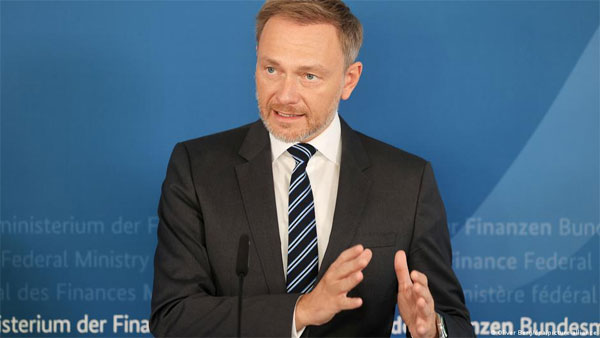
Fracking: The energy issue splitting the German government
Berlin, Nov 06: Fracking has become the latest issue to stress-test Chancellor Olaf Scholz's coalition government, after Finance Minister Christian Lindner raised the prospect of lifting Germany's partial ban last week.
"We have considerable gas reserves in Germany that can be extracted without endangering drinking water," the leader of the neoliberal Free Democratic Party (FDP) told the Funke Media Group. The extraction could be "responsible within ecological conditions," Lindner said, before arguing that it would in fact be more "irresponsible to forgo fracking out of ideological commitments."

The extraction method — fracturing bedrock by pumping water and chemicals into it to release gas — was partially banned in Germany in 2016. But a string of politicians, mostly from the far-right Alternative for Germany (AfD) and the center-right Christian Democratic Union (CDU), have insisted that it remains a viable way to find new fossil fuels on German soil.
The Environment Ministry, led by the Green Party's Steffi Lemke, lost no time in shooting Lindner's idea down. "Fracking gas is damaging to the climate and extracting it damages the environment," a ministry spokesman told the RND news network. Extracting it was banned in Germany "for good reason," he said.

Is fracking an option?
That was backed up by Mathias Koch, policy adviser on the German energy transition at E3G, an independent climate change think tank in Berlin. "By the time fracking could make any meaningful contribution to Germany's energy supply, we can already save much more through insulating buildings and installing heat pumps," he told DW. "It's irresponsible to distract from the actual solutions by dragging yet another nonissue to the forefront."
Germany theoretically has enough natural gas under its own territory to cover 20% of the country's needs, but only half of it is "economically viable," according to the gas and oil industry association BVEG. On top of that, the BVEG told the ARD broadcaster in April that it would take three years of exploration just to establish where the new extraction sites should be, never mind actually start pumping gas out of the ground.
Other problems with fracking are the inevitable environmental damage, the danger of releasing methane (an even more dangerous gas for the climate than CO2) and even the threat of triggering earthquakes. All of these explain why fracking is also unpopular: A survey conducted by the pollster infratest dimap from August 2022 found that only around one in four Germans is in favor of fracking on home soil, compared to more than half in favor of extending nuclear power.

Driven by political need
Many observers suspect that Lindner's intervention was rooted in political worries rather than concerns for Germany's energy supply. The FDP, mainly a center-right neoliberal party, has been struggling in regional elections: It shed more than half its vote share in North Rhine-Westphalia in May and dropped out of the Lower Saxony state parliament altogether in a disastrous election last month.
In response, Lindner increasingly appears to be setting out positions opposed by the center-left parties with which he shares the government: Scholz's Social Democrats and the Greens.
It's a risky move that could destabilize the coalition, but Karl-Heinz Paque, chairman of the FDP-affiliated Friedrich Naumann Foundation and currently a member of the party's federal leadership committee, told DW that Lindner's initiative was based on principle rather than political expediency.
"The FDP is fundamentally open to technologies, and that includes fracking of course," he said. "I'm no expert, but what I've read suggests that there are new forms of technology in this area. I don't see this in connection to any coalition discussion."

Paque said disagreements were normal in any coalition. "The Greens have ideas that we don't share, we have ideas that the Greens don't share, and we have to make compromises within the coalition," he said, before pointing out that the conservative Christian Democratic Union (CDU) was itself internally divided on fracking.
It's no secret that the FDP is generally more at home in a coalition with the CDU, both politically and historically. "Of course, this is not an easy situation for us," said Paque. "Many of our voters do not particularly like this coalition."
There's also no doubt that the ambitious modernization plans that the new government put in its contract last December, many of which were driven by the FDP, have been thwarted by the war in Ukraine. Just as the Greens have had to make compromises on fossil fuels, the FDP has had to make compromises on its fiscal principles: Finance Minister Lindner has found himself spending much more public money: On defense particularly, but also on protecting businesses and people from spiraling energy costs.
Paque said the FDP remained behind its leader: "Lindner is a very strong leadership figure, and he has led the party out of quite a few crises."
But Mathias Koch was damning about the noise Lindner is making. "This is yet another attempt by the FDP to regain ground by blowing up a minor issue in the debate, much like the weeklong wrangling over the nuclear extension," he said. "They now appear to cater increasingly to the last few voters that want to see the energy transition slowed down."
Edited by: Rina Goldenberg
While you're here: Every Tuesday, DW editors round up what is happening in German politics and society. You can sign up here for the weekly email newsletter Berlin Briefing.
Source: DW


 Click it and Unblock the Notifications
Click it and Unblock the Notifications

































